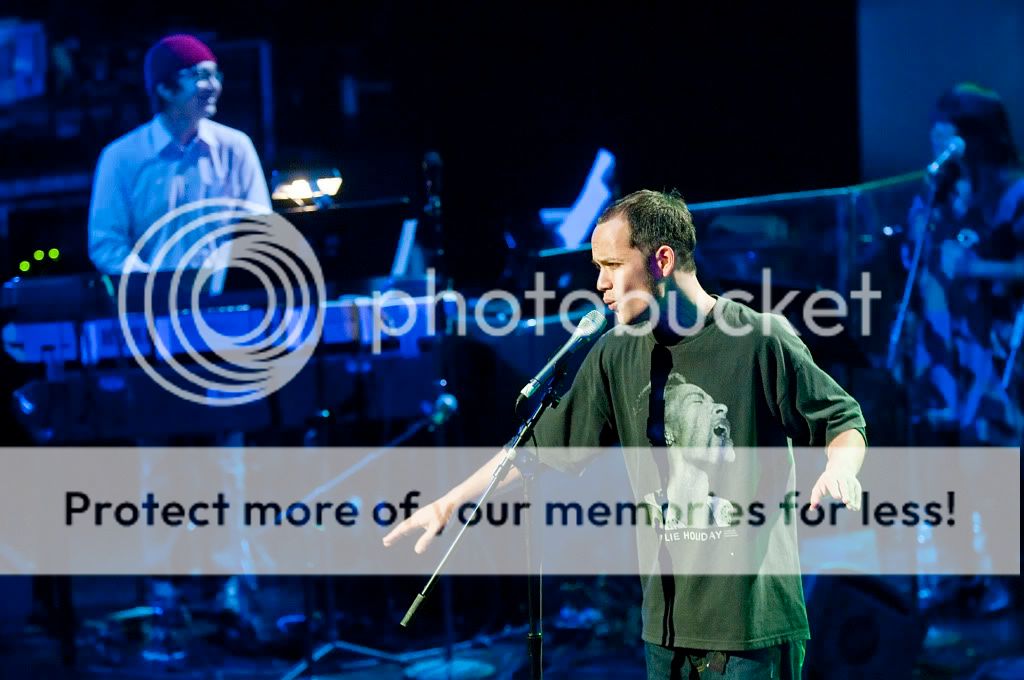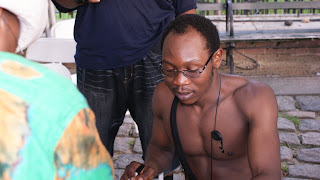 Vieux Farka Toure is one of the world’s brightest young stars, picking up where his legendary father Ali left off playing his native Mali’s traditional music all over the world. After his show at Central Park Summer Stage last month, I was lucky enough to interview him on music, Africa, climbing out from his father’s shadow, and a lot more…
Vieux Farka Toure is one of the world’s brightest young stars, picking up where his legendary father Ali left off playing his native Mali’s traditional music all over the world. After his show at Central Park Summer Stage last month, I was lucky enough to interview him on music, Africa, climbing out from his father’s shadow, and a lot more… My first question is as an African musician, do you find it difficult to reach a mainstream audience? Do you ever get frustrated by being categorized into an "exotic other" category such as "world music"?
I GUESS I HAVE BEEN PRETTY LUCKY BECAUSE THE KIND OF MUSIC I AM DOING SEEMS TO BE REACHING A PRETTY WIDE AUDIENCE – AT LEAST FROM WHAT I CAN SEE FROM THE STAGE ! LAST WEEKEND I PLAYED ON THE ROCK STAGE AT THE ROSKILDE FESTIVAL IN DENMARK WITH BANDS LIKE BATTLES AND COCOROSIE ...AND THE AUDIENCE JUST SEEMED TO BE THERE TO HEAR AND DANCE TO GOOD ROCK, AND DIDN’T STOP ROCKING WHEN I PLAYED – THEY SEEMED TO GET EVEN CRAZIER ! THEN WE PLAYED A MORE TRADITIONAL AFRICAN FESTIVAL IN HOLLAND. NEXT WEEKEND WE’LL BE PLAYING A HUGE FESTIVAL IN SPAIN WHERE I’VE INVITED IDAN RAICHEL (WHOM I’VE MET IN AIRPORTS AROUND THE WORLD BUT HAVEN’T MANAGED TO ACTUALLY PLAY WITH YET!) TO SIT IN. I DID A RADIO SHOW LAST SUMMER WITH COUNTRY MUSICIANS (I REALLY LIKED DIERKS BENTLEY) AND ALSO AN AFRICA EXPRESS SHOW IN LIVERPOOL , PLAYING WITH OTHER AFRICANS LIKE AMADOU AND MIRIAM,BAABA MAAL, RACHID TAHA AND COLLABORATING WITH ALL THE NEW ENGLIGH ROCK MUSICIANS LIKE DAMON ALBARN AND FRANZ FERDINAND . AND I’LL BE DOING A US TOUR THIS AUGUST IN A TRIBUTE TO JAMES BROWN WITH PEE WEE ELLIS AND FRED WESLEY. SO I’D HAVE TO SAY I’M NOT FEELING TOO BOXED IN !
Growing up and now, who are some of your greatest musical influences outside of Mali?
MY FAVORITE MUSICIAN GROWING UP WAS PHIL COLLINS. I ALSO REALLY LOVE BRYAN ADAMS. I LISTEN TO ANYTHING – I AM YOUNG (DESPITE MY NAME!) AND HAVE EVERYTHING FROM REGGAETON TO HIPHOP TO BLUES TO TRADITIONAL MALIAN MUSIC ON MY I-POD.
You've traveled all over the world playing music, how has what you've seen and experienced in your travels shaped and stretched your perspective on your music and life as a whole?
IT’S TOTALLY CHANGED ME. YOU CAN’T TRAVEL THE WORLD, SEE OTHER CULTURES. EAT OTHER FOODS, MEET OTHER PEOPLE ALL THE TIME AND NOT HAVE THAT AFFECT YOUR WAY OF SEEING THE WORLD, AND OF COURSE THAT FILTERS INTO THE MUSIC. BUT OF COURSE IT ALSO MAKES ME VALUE EVEN MORE MY HOME, MY COUNTRY . WHEN I GET BACK TO MALI, AH...NOW THAT FEELS GOOD. I ALWAYS WANT TO LIVE THERE. BUT I’D MAYBE LIKE TO BRING SOME OF THE GOOD THINGS I HAVE SEEN ON MY TRAVELS BACK TO MALI. I AM ALWAYS SO IMPRESSED BY THE HUGE WINDMILLS ACROSS EUROPE AND I KEEP THINKING WE COULD USE ONE OF THOSE IN NIAFUNKE WHERE THERE IS ALWAYS WIND.
Since your father was such a legendarily famous Malian musician, do you ever feel burdened by having to always be compared to him? Do you ever feel like people don't give you enough respect on your own merits as a musician because of your name?
IT’S A GOOD THING AND A HARD THING TO HAVE A FATHER LIKE ALI. HE’ S A LEGEND WORLDWIDE AND I CAN’T COMPETE WITH THAT...ALL I CAN DO IS MY BEST AND HOPE THAT PEOPLE WILL SOMEDAY RECOGNIZE MY TALENT AS SOMETHING ELSE, SOMETHING DIFFERENT. B-U-T I ALSO KNOW THAT A LOT OF PEOPLE LISTENED TO MY FIRST ALBUM, PAID ATTENTION TO IT BECAUSE I AM ALI’S SON AND THAT’S A GOOD THING. THERE ARE HUNDREDS, MAYBE EVEN 000’S OF TALENTED ARTISTS OUT THERE, MAYBE WHO HAVE MORE TALENT THAN ME. BUT I HAVE BEEN LUCKY ENOUGH TO HAVE A FAMOUS FATHER AND SO MY FIRST RECORD WAS OF INTEREST TO PEOPLE. NOW I HAVE THE CHALLENGE OF MAKING THE SECOND ONE EVEN BETTER !
You've released two albums with Modiba records so far, do you have plans to go back into the studio anytime in the near future to record a third?
YES, I HAVE BEEN RECORDING FOR THE PAST COUPLE OF MONTHS IN BAMAKO WHENEVER I CAN (AND AM NOT TOURING!) AND HAVE ABOUT 13 TRACKS READY FOR SOME POST PRODUCTION NOW. I AM HOPING WE CAN GET SOMEHTING OUT FOR EARLY 2009...
Your second album was a collaboration with various dj's that fused your traditional African sound with a more modern electric sound, who are some musicians you're interested in collaborating with on future projects both from West Africa and the rest of the world?
OH WOW, THAT’S A HARD QUESTION. WE’VE BEEN TALKING WITH DIRTY PROJECTORS ABOUT DOING SOME SHOWS TOGETHER. I JUST DISCOVERED WILCO ON OUR LAST ROAD TRIP – THEY ARE INCREDIBLE. OF COURSE I’D LOVE SOMEDAY TO WORK WITH BRYAN ADAMS. AND ON REGGAE, WELL, THE SKATALITES AND ALPHA BLONDY ARE MY HEROES. I JUST SPENT THE LAST WEEKEND AT FESTIVALS WITH MAMER KASSEY FROM NIGER , I LISTEN TO HIM ALL THE TIME AT HOME AND HIS GUITARIST IS ONE Of THE ALL-TIME GREATS; I’D LOVE TO DO SOMETHING WITH HIM ,MAYBE TRAVEL TO NIGER AND DO SOMETHING THERE.
My last question, your record label, Modiba productions, has repeatedly in the past donated parts of its sales profits to different charitable causes in Africa such as the ASAP album and buying malaria nets. Do you feel that enough African musicians use their financial success to instigate positive change in their home countries?
I THNK THERE ARE LOTS OF GOOD THINGS BEING DONE BY MANY AFRICAN MUSICIANS BUT I ALSO BELIEVE WE CAN – AND SHOULD – ALWAYS DO MORE. WE ARE LUCKY – WE OFTEN HAVE INFLUENCE, AND WE CAN HELP DIRECTLY. I AM SENDING MOSQUITO NETS DIRECTLY TO MY VILLAGE – AS MY FATHER USED TO SAY, WHEN THE WIOND BLOWS EVERYONE GRABS HIS OWN HAT.SO WHATEVER I CAN DO TO HELP MY OWN VILLAGE, I MUST DO.
www.vieuxfarkatoure.com/







































